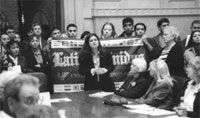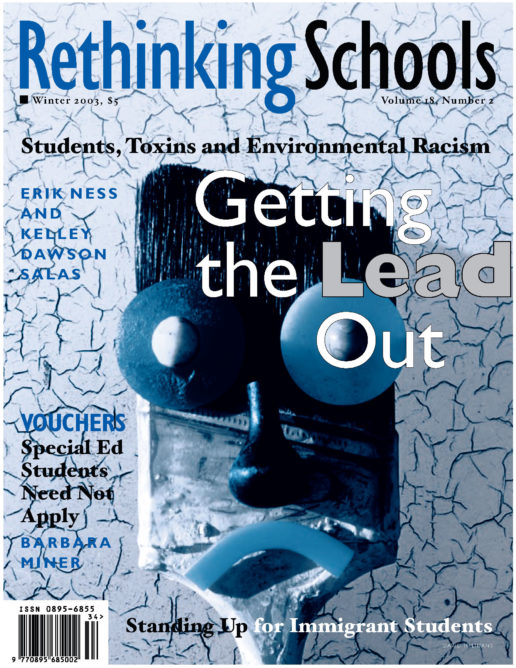Action Education: Immigrant Students Demand Higher Education
Illustrator: Joseph Blough

at Wisconsin ‘s State Capitol
on behalf of immigrant students.
photo: Joseph Blough
Brenda wants a chance to go to college. Now a junior at Horlick High School in Racine, Wis., she has lived in the United States since she was six years old. But she was born in Mexico and is not a legal resident of the United States.
“I really want to go to college. I’ve been working hard to get advanced classes so I can have a good record for college. If I cannot go to college, all my hard work will go to waste,” she said.
On October 29, Brenda stood up in front of hundreds of people to share her story with Wisconsin lawmakers. Brenda was not alone: Members of youth groups, labor unions, immigrant rights organizations, and churches packed a hearing room at the Wisconsin State Capitol. They were there to support AB-95, an assembly bill that would allow undocumented immigrants who qualify for college admissions to pay in-state tuition rates.
Christine Neumann-Ortiz, who coordinates a migrant education program at Milwaukee-Area Technical College and founded Voces de la Frontera, an immigrant worker center in Milwaukee and Racine, says she’s encouraged by the strong show of support by youth. “I think the issue really touched a chord with a lot of students, especially Latino students. These are people they know on a personal level, kids that they’ve grown up with. And they realize that they’re about to graduate, and they see how they try just as hard and that they’ve reached a dead end.” said Neumann-Ortiz.
If they are undocumented, students who are legally entitled to a K-12 education find themselves unable to afford to continue on to college. Although undocumented students are legally allowed to attend Wisconsin’s universities, they are required to pay out-of-state tuition and are not entitled to financial aid.
Organizers hope that Wisconsin will follow the lead of New York, Texas, Illinois, California, and several other states that currently grant in-state tuition to undocumented students.
“The financial burden of paying out-of-state tuition rates places college out of reach of the vast majority of undocumented students,” said Rep. Pedro Colón, a Democrat from Milwaukee, who is sponsoring AB-95. Colón says 50,000-65,000 undocumented children graduate from U.S. high schools each year.
In Wisconsin, the undocumented population is estimated at approximately 41,000, although it’s difficult to count people who fear deportation and struggle to stay under the radar of immigration officials.
If AB-95 becomes law, immigrant students without legal status could pay in-state tuition rates if they graduate from a Wisconsin high school or receive a GED, live in Wisconsin for at least one year previous to graduating, and provide an affidavit to the college or university stating that they have applied or will apply for citizenship status. Because of the relatively small number of students who would qualify by meeting residency requirements, the number of students directly affected is probably in the hundreds, according to Andy Janssen, an aide to Rep. Colón.
The difference between in-state and out-of-state tuition in Wisconsin is vast. At the University of Wisconsin-Milwaukee, Wisconsin residents attending school full time in the 2003-04 school year will pay $5,106.00 in tuition, while non-residents pay $17,858.00, more than three times as much.
“There are students who played by all the rules, who went through school, who did well; but unlike students who are documented, they don’t get the opportunity,” says John Goldstein, president of the Milwaukee County Labor Council. “We can clearly see the difference in what they’re doing four, five, and six years after graduation. It sends a bad message to students to tell them that if they do well in high school, if they aspire to higher education, they can succeed in our society-and yet what really happens is they do well and then they get a slap in the face.”
The bill is currently in the hands of the members of the Assembly Committee on Government Operations and Spending Limitations. For the bill to move forward, a two-thirds majority of the six-person committee needs to vote to move it. The Republican Speaker of the Wisconsin assembly has said he will support the bill if it reaches the floor.
The Oct. 29 hearing was an eye-opener for some of the committee members, who asked basic questions about why so many immigrants remain undocumented. Some students explained that they had been waiting for years for the INS to consider their residency applications. Others stepped forward to explain the injustice involved in denying educational opportunities to students who are unable to change their immigration status. After one student testified, the legislator who chairs the committee asked her whether she was a legal immigrant or not. Shouts and murmurs echoed through the hearing room, and the student stood silent before the crowded room. Neumann-Ortiz stepped up to explain that students are advised not to publicly disclose their immigration status.
Neumann-Ortiz said the committee members’ questions at the hearing demonstrated that lawmakers need to be educated about the role immigrants play in our society. “Even though undocumented workers are such a big part of our community, there is not enough information out there for people to know that the immigration laws are ineffective and that they are consciously and systematically creating a large pool of undocumented workers and families,” she explained.
Gerardo Mancilla, who is studying elementary education and communication at UW-Madison, told the committee he thinks it’s ironic that illegal immigrants are welcomed into the military but not to college. “We have the same dreams as everybody else,” said Mancilla. “I personally have a couple of friends who are undocumented and it’s hard for me to hear their stories and to hear that after high school they’re not going to do anything because they don’t have papers. They can’t go to a higher education institution because they can’t afford it; they can’t get financial aid. And the only thing that is available for them to do is go into the military. It is hard to see dreams shattered.”
Allen Levie, a teacher at Racine Horlick High School, brought 45 students to the hearing as a field trip. Eighteen percent of Racine Horlick’s students are of Latino origin and Levie says his students are energized about the issue. He said an additional 30 students wanted to come to testify, but they wouldn’t all fit on the single bus the school sent.
Levie, who teaches Latino-American history, says his students’ activism stems from their classroom work on immigration. They have been studying how U.S. corporations have lured undocumented immigrants from poor countries to the United States.
His students also visited Milwaukee when the Immigrant Freedom Ride (a national tour designed to draw attention to the plight of U.S. immigrants) stopped in Wisconsin. His students are going to follow AB-95 as an example of how a bill becomes a law. And Levie hopes he can find funding to take them to Washington, D.C., to lobby for the “DREAM Act.” [See editorial, page 5.]
“I’m looking at the curriculum and saying how does this stuff catch these kids’ attention?” said Levie. “I’m thinking of ways to make this real life. For these Latino kids, this is real life.”
Levie said one of his students who testified in Madison has trouble speaking up in class. “Normally, if she has to make a presentation in class, she can’t. Her voice quivers. But she got up there [at the hearing] and just belted it out. She said she went home and told her mother what happened, and her mother cried. She said, ‘You know, Mr. Levie, when I told my mother about the field trip, she said, normally I wouldn’t let you miss school but I’m so proud that you want to go and do this.'”
Although the passage of AB-95 will only help a small fraction of students who overcome poverty and educational inequality to qualify for university admission, it will serve as a jumping-off point to discuss our national education priorities. “In the United States, we have plenty of resources for everybody for education,” said Neumann-Ortiz. “At the federal level, most of the funding is going towards the military. There seems to be an unending pot available. And at the same time, we’re seeing education cuts in all kinds of areas. So this is just one part of a broader struggle in terms of access to higher education.”
Neumann-Ortiz says passing AB-95 is a first step toward repealing policies that are examples of institutionalized racism. “You basically have this two-tiered policy where if you’re a citizen you can go to college and if you’re an undocumented student, regardless of how long you’ve been here, regardless of how long your family has worked here and contributed, you don’t have that right. So it really is an unjust system.”
Students Weigh In on Immigration
The following excerpts are from letters to the editor written by students
at Horlick High School in Racine, Wis. The students were responding to a letter that appeared in the Racine Journal Times after an immigrant rights protest. That letter read, in part: “Hello, what don’t you understand? You are here illegally, why should you get any justice? When and if you can become a citizen, then you can protest about labor justice . . . the law should have been there [at the protest] to deport all illegal immigrants.” Allen Levie, who teaches Latino-American history at Racine Horlick, had all his students read the letter and used the following questions to prompt discussion and letter writing: What do you think about the article? Should everyone have the right to justice or just citizens? How do illegal immigrants benefit the local economy? How do they hurt the local economy? How does the letter to the editor make you feel?
All peoples on this planet, U.S. citizens or not, deserve justice and freedom. You say legal citizens do not have jobs because illegal immigrants work for a much lower salary. It is not true. Illegal immigrants take jobs that most citizens do not want. Illegal immigrants benefit the economy by doing those jobs. They also pay taxes but do not receive benefits. Because they are not legal citizens doesn’t mean they deserve to be treated less humanely than citizens.
—Jessie Sanchez
What if a family member of yours came here illegally? Would you try and get them deported? No, I don’t think you would. You would want them to try and make a better life for themselves here in the U.S. than in the country they are fleeing from. Most of these people are trying to become legal citizens but it takes years for papers to go through our ridiculously
backed up system.
These people don’t hurt our economy. They pay taxes and don’t receive any back so really they are helping. They want jobs that most people do not want. They work hard labor such as construction, landscaping, cleaning, and a lot of other things as well. We are offended and appalled at the fact that so many people are ignorant to the facts and situations of the immigrants that come here.
—Krystal Rendan
The following students contributed their ideas to the two preceding letters: Ivette Sanchez, Alex Ventura, Cecilia Leal, Brenda Garcia, Viviana Pastrana, David Garcia, Andres Garcia, Jessie Sanchez, Alex Avila, Sherry Castillo, Jessica Cheever, Nick Johnson, Jordan Coon, Crystal Nelson, Jeremy Harpe, and Tim Basaldua.

